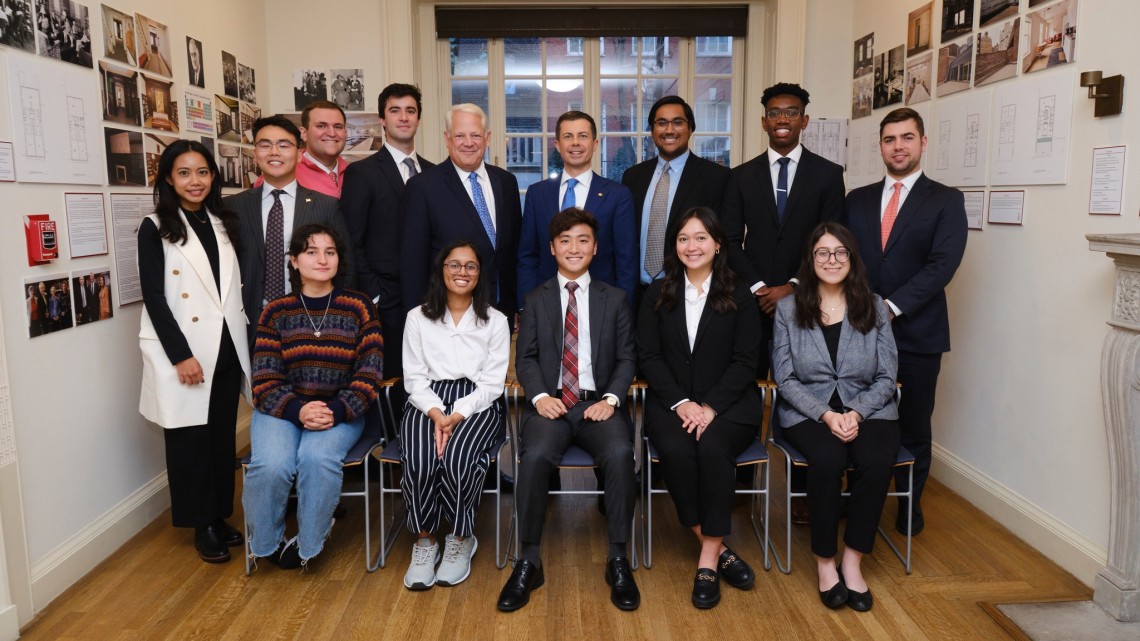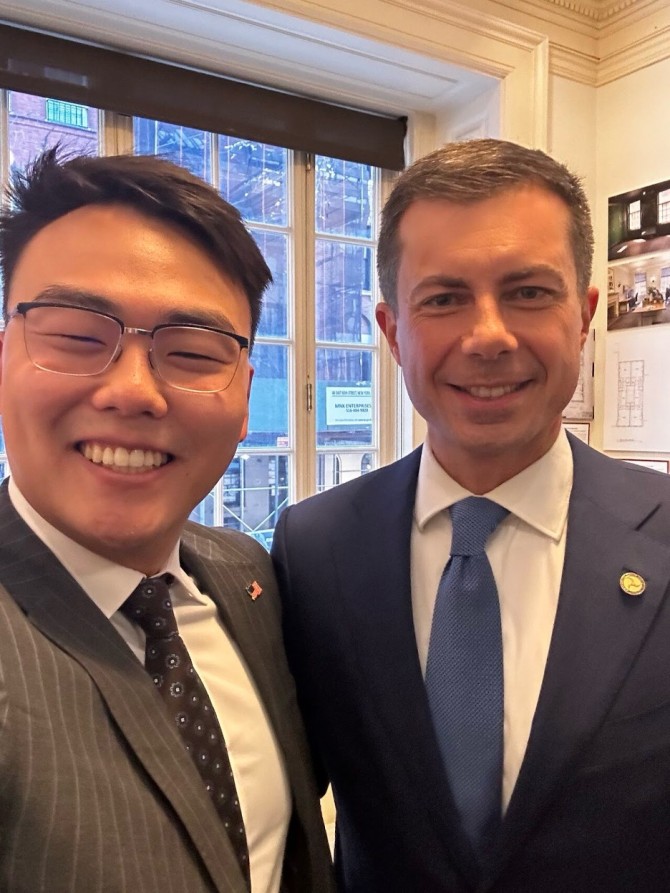
Cornell students pose with U.S. Secretary of Transportation Pete Buttigieg and Cornell Brooks School Institute of Politics and Global Affairs Director Steve Israel at the Roosevelt House.
News directly from Cornell's colleges and centers
U.S. Secretary of transportation encourages students to participate in local politics
By Sheri Hall
U.S. Secretary of Transportation Pete Buttigieg provided an intimate look at the most pressing issues in federal infrastructure planning during a conversation on November 2 with students and faculty members from the Cornell Jeb E. Brooks School of Public Policy and the Roosevelt House Public Policy Institute at Hunter College.
Buttigieg highlighted projects that will make U.S. infrastructure more resilient to climate change, invest in mass transit and pedestrian safety, and expand broadband Internet. The conversation was moderated by the Cornell Brooks School Institute of Politics and Global Affairs Director Steve Israel, a former member of Congress, and Roosevelt House Policy Program Director Basil Smikle in New York City.
Many of the projects Buttigieg discussed are funded by the 2021 Infrastructure and Investment Jobs Act, which provides $550 billion of federal infrastructure investments through 2026.
“Infrastructure is the literal foundation of our economy,” Buttigieg said.
Funding broader infrastructure projects like water pipes and broadband Internet is an important component of the funding package because when we think about infrastructure, we should think about everything that connects people to the economy, he said.
“Economically, to succeed in life, a connection to the Internet is as vital as a connection to the interstate highway system,” he said. He compared the broadband expansion to historic projects such as rural electrification.
“Nobody today could imagine that we would have just not electrified the entire country,” he said. “One day, I think, nobody will be able to imagine that we would have not made sure everybody had the Internet or was a little closer to a transportation line.”
Buttigieg also noted that, for the first-time ever, federal infrastructure funding includes dedicated money for climate resiliency.
“Transportation planners don’t have the luxury of sitting around debating whether climate change is a thing,” he said. “Last year, we had transit in the Pacific Northwest shut down because the cables would have melted if they had kept running during a heat wave that should have been impossible, but happened. This is happening to our infrastructure today.”
Federal infrastructure plans are also increasingly focused on safe, active transportation, and public transit because research shows young people are driving less, Buttigieg said.
“Growing up in the years I was growing up in the Midwest, you counted down the days to getting your driver’s license because it was the threshold that represented freedom,” he said. “Today, we are beginning to realize that freedom should be conceived more broadly to getting where you need to be.”
“We have the most money going to transit ever,” he said. “It’s urgently needed and it’s a big part of the fight against climate change.”
Buttigieg also highlighted what he called “a crisis of roadway deaths.” More than 40,000 people were killed in motor vehicle crashes last year, according to the National Highway Traffic Safety Administration – nearly approaching the number of firearm deaths in the U.S.
“It’s so universal,…but these deaths are preventable,” he said. “The element that has risen the fastest is pedestrian and cyclist deaths. We need to make sure we design around that and plan around that.”
“I see a lot of promise in some of the technologies that have emerged, but we have to go much farther,” he said.
Buttigieg encouraged students to share their voices and opinions because many of the decisions about how federal funding is spent are made at the state and local levels.
“I hope you are conscious of how empowered you are,” he said. “If you want to testify in Congress, you actually have to be invited, right? But in a city council hearing or a zoning board process or a Transit Authority Board Meeting or often a state assembly committee meeting, depending where you live, you can just show up and be heard. And so I hope that citizens, students, residents are conscious of the chance that you have to influence the places where the decisions are made.”
For Andy Shin ‘23 MPA ‘25, who attended the talk, hearing Buttigieg speak was a call to action to get more involved in local politics.
“It’s a powerful reminder that our voices can – and should – be heard in local governance,” Shin said. “From city council hearings to state assemblies, it’s clear that opportunities to influence decision-making are much more accessible than one might think.”
Media Contact
Get Cornell news delivered right to your inbox.
Subscribe


